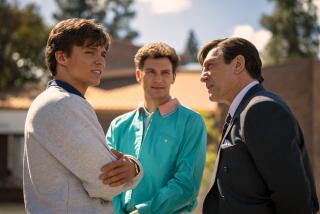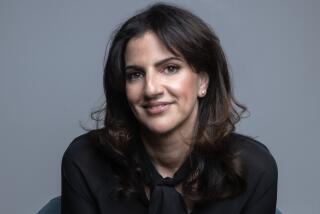Carine McCandless on âThe Wild Truthâ and her brother Chrisâ life
In April 1992, Chris McCandless walked into the Alaskan wilderness. He survived there for more than 100 days before perishing in an abandoned bus. Since then, millions have become captivated with his story, reading about it in Jon Krakauerâs iconic âInto the Wildâ or watching it in Sean Pennâs film of the same name.
But more than 20 years after Chrisâ body was discovered, readers and viewers still struggle to understand what motivated him to abandon his family and a life rooted in what appeared to be an idyllic home in the suburbs of Washington D.C., for the harsh wilderness of Alaska.
In âThe Wild Truthâ (HarperOne, $27.99), Chrisâ sister, Carine McCandless, comes forward to set the record straight, revealing the much darker reality of Chrisâ family life: a violent home in which their father beat and belittled their mother and where both parents manipulated the details of a second family.
Amid the many misconceptions of her brother, Carine speaks up to explain âthat going into the wild was far from crazy; it was the sanest thing [Chris] could have done.â
We spoke by phone with the Virginia-based entrepreneur, activist and mother. McCandless will be discussing and signing her book at Book Soup in West Hollywood on Friday at 7 p.m.
It has been over two decades since your brotherâs death. Why did you decide that now was the time to tell Chrisâ entire story?
First and foremost, [it was] becoming a mother and having my relation to this very well-known story shift from [me] being a daughter and a sister to being a sister and a mother. I really understood the importance of having the complete truth out there. I saw how much learning from that had helped me in my own life and had helped me reach a peaceful place where I could really focus on the important things in life.
But also, itâs been especially important over the years that Iâve worked with students. Sharing Chrisâ story and filling in the blanks for them becomes not just an assignment, but this lesson that they can take with them outside of college walls. So many are inspired by Chrisâ story already but being able to share that other side, give the personal insight and answer all those lingering âWhy?â questions, I think makes the lessons that much more thorough and powerful.
Looking back now, do you think it was your primary role as a daughter that was holding you back from coming out with the whole truth when Jon Krakauer began writing âInto the Wildâ?
Yes, definitely. As much as I was upset with my parents, I could see them hurting â my mother especially; I was her last surviving child. I knew that if I was completely honest about Chrisâ childhood and all that I knew about what drove him to these extremes, that would cause undue pain to my parents, and would take away their opportunity to learn from his disappearance and his death.
I waited 20 years, for two particular people to learn that lesson, and it still did not come to fruition. But ... I was contacted by people all over the world who had read Jonâs book and had seen the film. I know and Iâve learned that the greatest inspiration can only come from truth. It became something that I just couldnât not do.
What did the process of writing and releasing the book feel like?
I didnât have doubt or anxiety, but I canât say that I never looked at what I had written on the page and sat back and thought, âOh my gosh, am I going to leave that there?â
I would say it was a cathartic experience but I honestly had already absorbed all the lessons in myself. I had already dealt with my anxiety about it. So when the time came to actually sit down and write, I had made the decision. And much like Chris, when I make a decision, Iâm going to follow through on it.
I just stayed focused on the mission and that was: this book is going to help people. Itâs not just about domestic violence â but thatâs an important message in there. Chrisâ story is a powerful example of the devastating effects that domestic violence in all forms can have on children and families. While I want people to understand that, itâs about more than just that issue.
I found my voice and was vocal in the writing of this book. I think Chris would be very proud of that. I want this book to help other people who are dealing with those circumstances find their strength and find their voice.
Chris found absolution in the wild. How were you able to build that with your siblings?
I think itâs a matter of survival. This book doesnât just focus on the sadness of Chrisâ death â much like [Krakauerâs] book didnât just focus on the sadness of Chrisâ death. It focused on the beauty of life. Jonâs book ends there: focusing on the beauty of Chrisâ life and how he was at peace when he died.
But Chrisâ story didnât end there. He has seven brothers and sisters. My book is the story of sibling survival. I think itâs through survival and all that weâve been through in life, learning what family is and what happiness is. Family is what you make of it. My brothers and sisters are an incredible gift and theyâve been a wonderful family to me and you know what? Given the circumstances, they didnât have to be....
You mention in your epilogue how one of the most difficult questions you had been asked was whether or not you have been able to forgive your parents.
I was recently asked by a student, âWhat is the line for you between forgiving and not forgiving?â And what immediately came out of me was, âhonesty.â The answer was immediate for me. Honesty. Thatâs it.
Iâm not trying to villanize my parents, Iâm trying to humanize them. People can learn from humans. Just like they can learn so much more from Chris by knowing heâs not just this iconic, legendary figure âheâs a human.
The huge lesson in all of this, and what I talk to students about so much, is owning responsibility for the choices you make in life, and the mistakes you make.... [My parents] Billie and Walt did not accept responsibility for the mistakes they made, and theyâre human mistakes. They havenât done anything that a lot of people donât do. Thatâs why this story is so relatable and can reach so many people in a powerful way. And it really speaks to the hypocrisy and self-righteousness that Chris saw and felt that he needed to separate himself from.
Have your parents read the book and do you know how they feel about it?
They have. I made sure that they received an advanced copy because I felt that it was only fair for them to be able to respond and not be bombarded by the media.
They released a blanket statement to ABC stating, âAfter a brief review of its contents and intention, we concluded that this fictionalized writing has absolutely nothing to do with our beloved son, Chris, his journey, or his character. The whole unfortunate event in Chrisâ life 22 years ago is about Chris and his dreams, not a spiteful, hyped-up, attention-getting story about his family.â
I donât feel I have to defend Chris or my actions in this book. I feel that the truth is the truth. And I wrote this book with that focus on truth and that was the pure intent in my heart, not to hurt my parents in any way.
But my parentâs statement in no way surprises me and it doesnât anger me. They never did understand their son nor the damage they were doing to him, or to any of us. So denial is what I expected. And I mean that not in a mean way. Itâs just what Iâve been living with my whole life, for 43 years.
More to Read
Sign up for our Book Club newsletter
Get the latest news, events and more from the Los Angeles Times Book Club, and help us get L.A. reading and talking.
You may occasionally receive promotional content from the Los Angeles Times.








